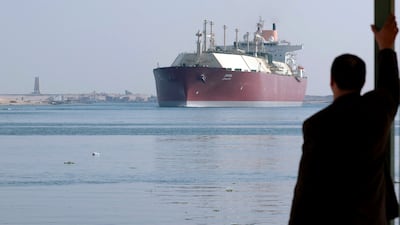Qatar’s threat to stop gas sales to the European Union if fined under a new law could set a precedent for other energy-exporting nations to resist stringent EU sustainability and reporting regulations, experts say.
Qatari Energy Minister Saad Al Kaabi told the Financial Times on Sunday that if any EU state imposed non-compliance penalties on the scale referenced in the corporate due diligence directive, Doha would stop exporting its liquefied natural gas to the bloc.
The EU’s Corporate Sustainability Due Diligence Directive (CSDDD) requires EU countries to impose fines for non-compliance with an upper limit of at least 5 per cent of the company’s annual global revenue.

“Qatar is one of the world’s largest LNG exporters. The EU is increasingly reliant on its LNG due to reduced natural gas supplies from Russia. A disruption in Qatari LNG shipments would likely exacerbate supply constraints, especially during winter months when demand peaks,” said James Willn, partner at global law company Reed Smith’s energy and natural resources group.
“Qatar’s response could set a precedent for other energy-exporting nations to resist stringent EU sustainability and reporting regulations. The EU may then face pressure to balance sustainability goals with economic and energy security considerations.”
What does the law state?
Passed by the European parliament last year and due to come into force by 2027, the CSDDD requires EU and non-EU companies with significant turnover in the bloc to ensure that their supply chains do not harm workers or the environment. Companies have new obligations to audit their supply chains for environmental damage and human rights violations.
The CSDDD requires all listed companies (except listed microenterprises) as well as large organisations to disclose information on risks and opportunities from social and environmental issues.
But the directive has prompted a widespread backlash from companies, both within and outside the EU, who have complained that the rules are too onerous.
Germany had called for the law to be postponed by two years and to exempt small and medium enterprises from the reporting duties as the bloc’s largest economy struggles with a downturn, Bloomberg reported this month. Changes are needed “in order to avoid unnecessary burden for businesses”, says the letter.
partner, Reed Smith’s energy and natural resources group
Failure to comply with the new reporting guidelines could result in fines of up to 5 per cent of companies’ net global turnover, as well as potential civil claims and reputational damage.
“If the case is that I lose 5 per cent of my generated revenue by going to Europe, I will not go to Europe … I’m not bluffing,” Mr Al Kaabi told the FT.
“Five per cent of generated revenue of QatarEnergy [the state-run energy company of which he is chief executive of] means 5 per cent of generated revenue of the Qatar state. This is the people’s money … so I cannot lose that kind of money – and nobody would accept losing that kind of money.”
However, Mr Al Kaabi suggested there could be room for compromise if the penalties targeted just income generated in Europe rather than total global revenue. “But if you want to come to my total generated revenue, come on, it doesn’t make any sense,” he said.
As European countries have sought to wean themselves off Russian gas, QatarEnergy has signed long term agreements to supply LNG to Germany, France, Italy and the Netherlands.

“Qatar could redirect its LNG exports to other markets, such as China, Japan or South Korea, which are major LNG importers and less likely to impose similar sustainability laws. The EU would need to seek alternative suppliers, such as the US, Australia or African nations, potentially at higher costs,” Mr Willn said.
But “whether this is realistic depends on several factors, including market conditions, infrastructure, contractual obligations and geopolitical considerations”, he said.
A significant portion of Qatar’s LNG exports is tied up in long-term contracts with specific buyers, including European countries. Diverting these supplies would be difficult unless there are force majeure conditions or legal grounds to breach contracts without incurring penalties, he explained.
Long-term contracts often specify destination clauses, restricting where the gas can be shipped. Altering such agreements would require renegotiation, which takes time and may face resistance.
“Diverting LNG to markets further away from Europe (e.g., Asia) would increase shipping times and costs, potentially affecting profitability. Qatar has one of the largest fleets of LNG carriers, giving it logistical flexibility, but significant redirection would still strain global shipping capacity,” Mr Willn said.
“The redirection of spot market volumes or incremental increases to Asian buyers is plausible, but fully abandoning the EU market would likely be economically and strategically unviable, certainly in the short term.”
Robin Mills, chief executive of Qamar Energy, said he'd be "very surprised if this really results in a halt".
"Europe is an important market for Qatar, and Qatari LNG is a key part of the EU’s supply, especially as they don’t want to be too reliant on the US under Donald Trump, and are still taking a significant amount of Russian LNG, which there is pressure to stop. Qatar LNG is anyway lower carbon than Russian or US gas," he said.
"I presume the two sides will work out a compromise. But it will mean reluctance to sign any new long-term contracts until it is resolved."
Mr Al Kaabi told FT that QatarEnergy would not break its LNG contracts, but it would look at legal avenues if it faced hefty penalties. “I will not accept that we get penalised,” he said. “I will stop sending gas to Europe.”


